LAW00150 Introduction to Business Law: Problem-Solving Approach
VerifiedAdded on 2023/06/12
|8
|1309
|50
Homework Assignment
AI Summary
This assignment delves into several business law problems, providing detailed analyses and solutions. It addresses issues such as restraint of trade, consideration in contracts, promissory estoppel, unfair contract terms, exclusion clauses, and the provisions of the Goods Act 1958 (Vic). The scenarios cover disputes related to flower shop operations, police protection fees, contractual promises, DVD rental penalties, dry cleaning liabilities, and defective goods. The solutions are supported by relevant case law and legal principles, offering a comprehensive understanding of how these legal concepts apply in practical business situations. Desklib provides a platform for students to access similar solved assignments and past papers.
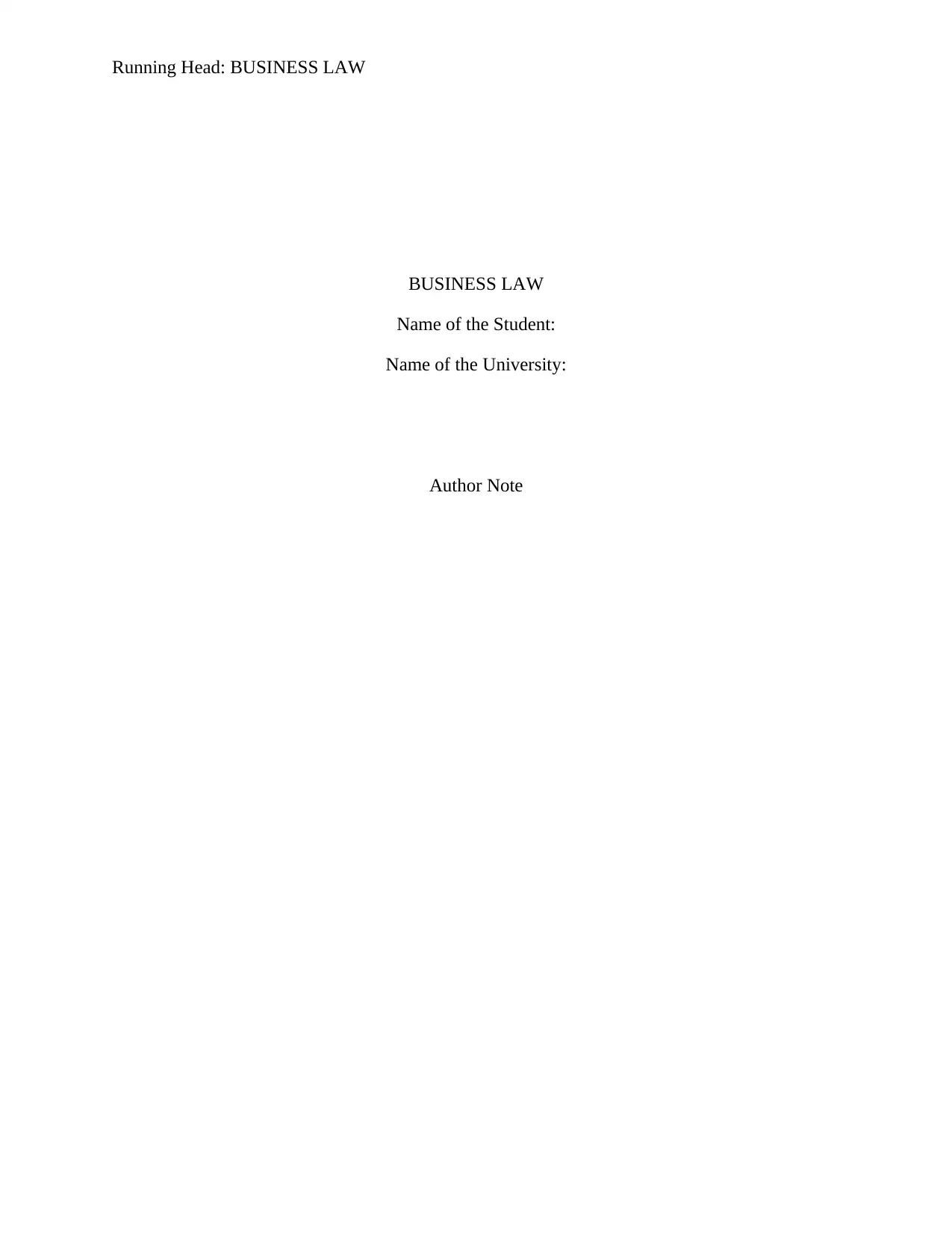
Running Head: BUSINESS LAW
BUSINESS LAW
Name of the Student:
Name of the University:
Author Note
BUSINESS LAW
Name of the Student:
Name of the University:
Author Note
Paraphrase This Document
Need a fresh take? Get an instant paraphrase of this document with our AI Paraphraser
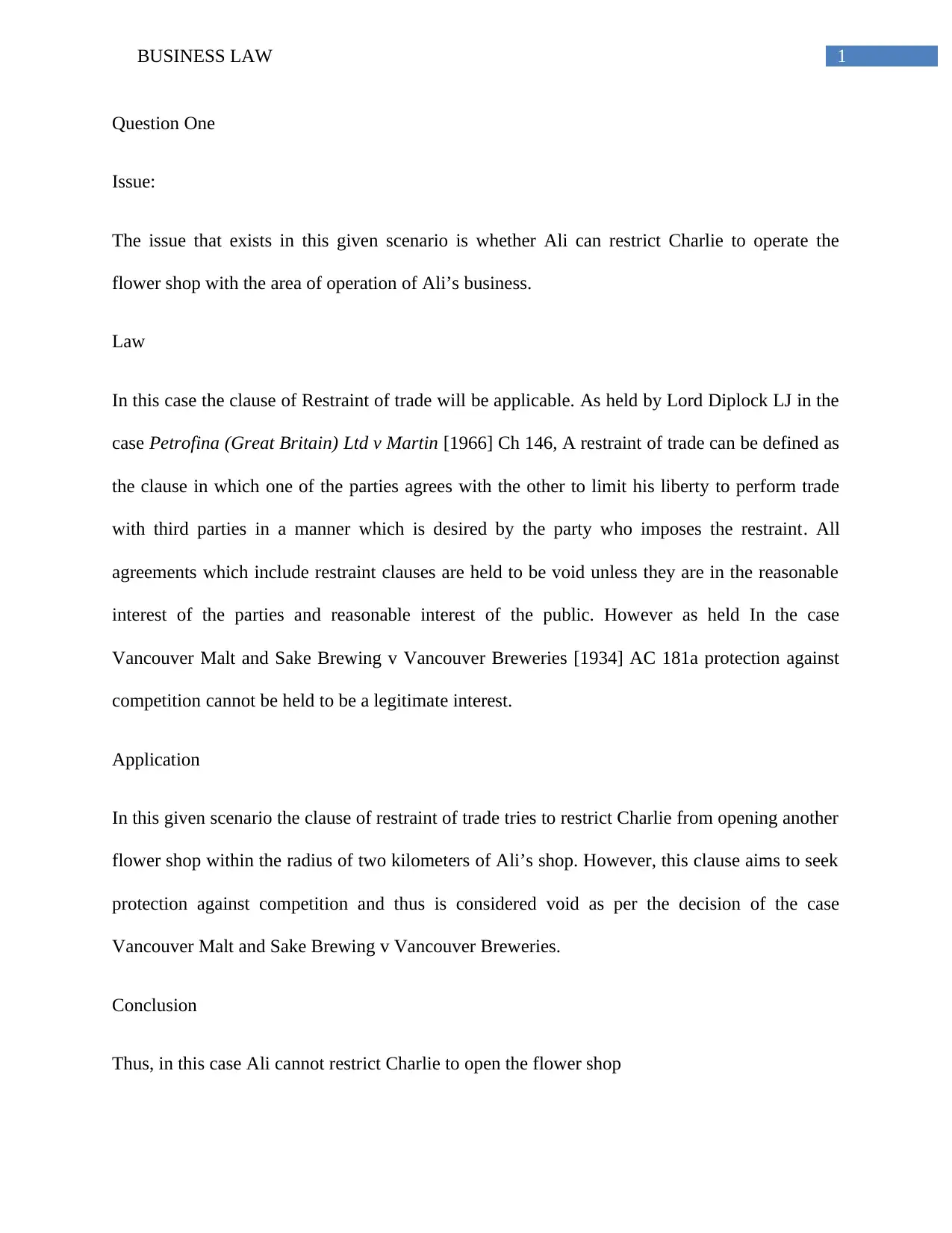
1BUSINESS LAW
Question One
Issue:
The issue that exists in this given scenario is whether Ali can restrict Charlie to operate the
flower shop with the area of operation of Ali’s business.
Law
In this case the clause of Restraint of trade will be applicable. As held by Lord Diplock LJ in the
case Petrofina (Great Britain) Ltd v Martin [1966] Ch 146, A restraint of trade can be defined as
the clause in which one of the parties agrees with the other to limit his liberty to perform trade
with third parties in a manner which is desired by the party who imposes the restraint. All
agreements which include restraint clauses are held to be void unless they are in the reasonable
interest of the parties and reasonable interest of the public. However as held In the case
Vancouver Malt and Sake Brewing v Vancouver Breweries [1934] AC 181a protection against
competition cannot be held to be a legitimate interest.
Application
In this given scenario the clause of restraint of trade tries to restrict Charlie from opening another
flower shop within the radius of two kilometers of Ali’s shop. However, this clause aims to seek
protection against competition and thus is considered void as per the decision of the case
Vancouver Malt and Sake Brewing v Vancouver Breweries.
Conclusion
Thus, in this case Ali cannot restrict Charlie to open the flower shop
Question One
Issue:
The issue that exists in this given scenario is whether Ali can restrict Charlie to operate the
flower shop with the area of operation of Ali’s business.
Law
In this case the clause of Restraint of trade will be applicable. As held by Lord Diplock LJ in the
case Petrofina (Great Britain) Ltd v Martin [1966] Ch 146, A restraint of trade can be defined as
the clause in which one of the parties agrees with the other to limit his liberty to perform trade
with third parties in a manner which is desired by the party who imposes the restraint. All
agreements which include restraint clauses are held to be void unless they are in the reasonable
interest of the parties and reasonable interest of the public. However as held In the case
Vancouver Malt and Sake Brewing v Vancouver Breweries [1934] AC 181a protection against
competition cannot be held to be a legitimate interest.
Application
In this given scenario the clause of restraint of trade tries to restrict Charlie from opening another
flower shop within the radius of two kilometers of Ali’s shop. However, this clause aims to seek
protection against competition and thus is considered void as per the decision of the case
Vancouver Malt and Sake Brewing v Vancouver Breweries.
Conclusion
Thus, in this case Ali cannot restrict Charlie to open the flower shop
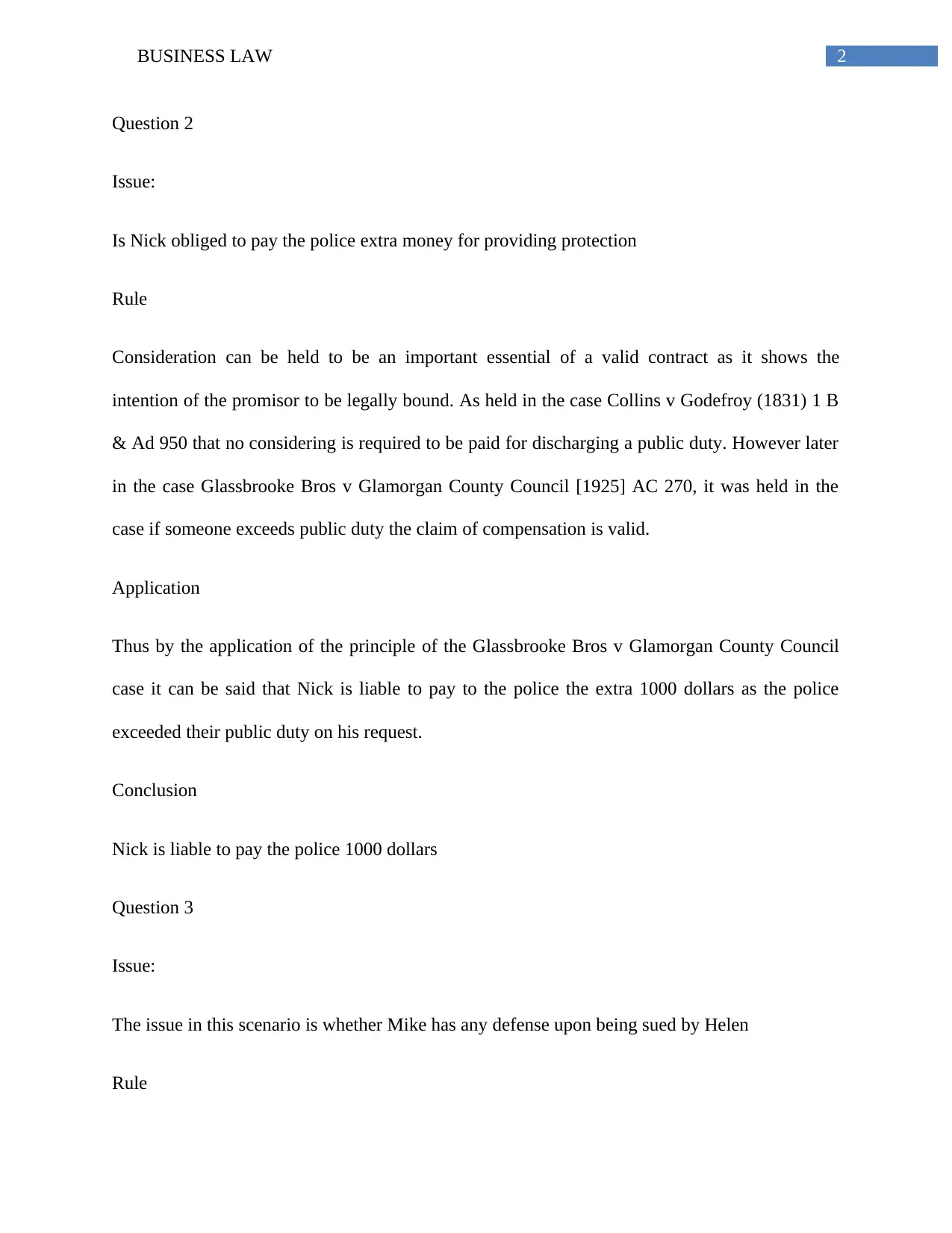
2BUSINESS LAW
Question 2
Issue:
Is Nick obliged to pay the police extra money for providing protection
Rule
Consideration can be held to be an important essential of a valid contract as it shows the
intention of the promisor to be legally bound. As held in the case Collins v Godefroy (1831) 1 B
& Ad 950 that no considering is required to be paid for discharging a public duty. However later
in the case Glassbrooke Bros v Glamorgan County Council [1925] AC 270, it was held in the
case if someone exceeds public duty the claim of compensation is valid.
Application
Thus by the application of the principle of the Glassbrooke Bros v Glamorgan County Council
case it can be said that Nick is liable to pay to the police the extra 1000 dollars as the police
exceeded their public duty on his request.
Conclusion
Nick is liable to pay the police 1000 dollars
Question 3
Issue:
The issue in this scenario is whether Mike has any defense upon being sued by Helen
Rule
Question 2
Issue:
Is Nick obliged to pay the police extra money for providing protection
Rule
Consideration can be held to be an important essential of a valid contract as it shows the
intention of the promisor to be legally bound. As held in the case Collins v Godefroy (1831) 1 B
& Ad 950 that no considering is required to be paid for discharging a public duty. However later
in the case Glassbrooke Bros v Glamorgan County Council [1925] AC 270, it was held in the
case if someone exceeds public duty the claim of compensation is valid.
Application
Thus by the application of the principle of the Glassbrooke Bros v Glamorgan County Council
case it can be said that Nick is liable to pay to the police the extra 1000 dollars as the police
exceeded their public duty on his request.
Conclusion
Nick is liable to pay the police 1000 dollars
Question 3
Issue:
The issue in this scenario is whether Mike has any defense upon being sued by Helen
Rule
⊘ This is a preview!⊘
Do you want full access?
Subscribe today to unlock all pages.

Trusted by 1+ million students worldwide
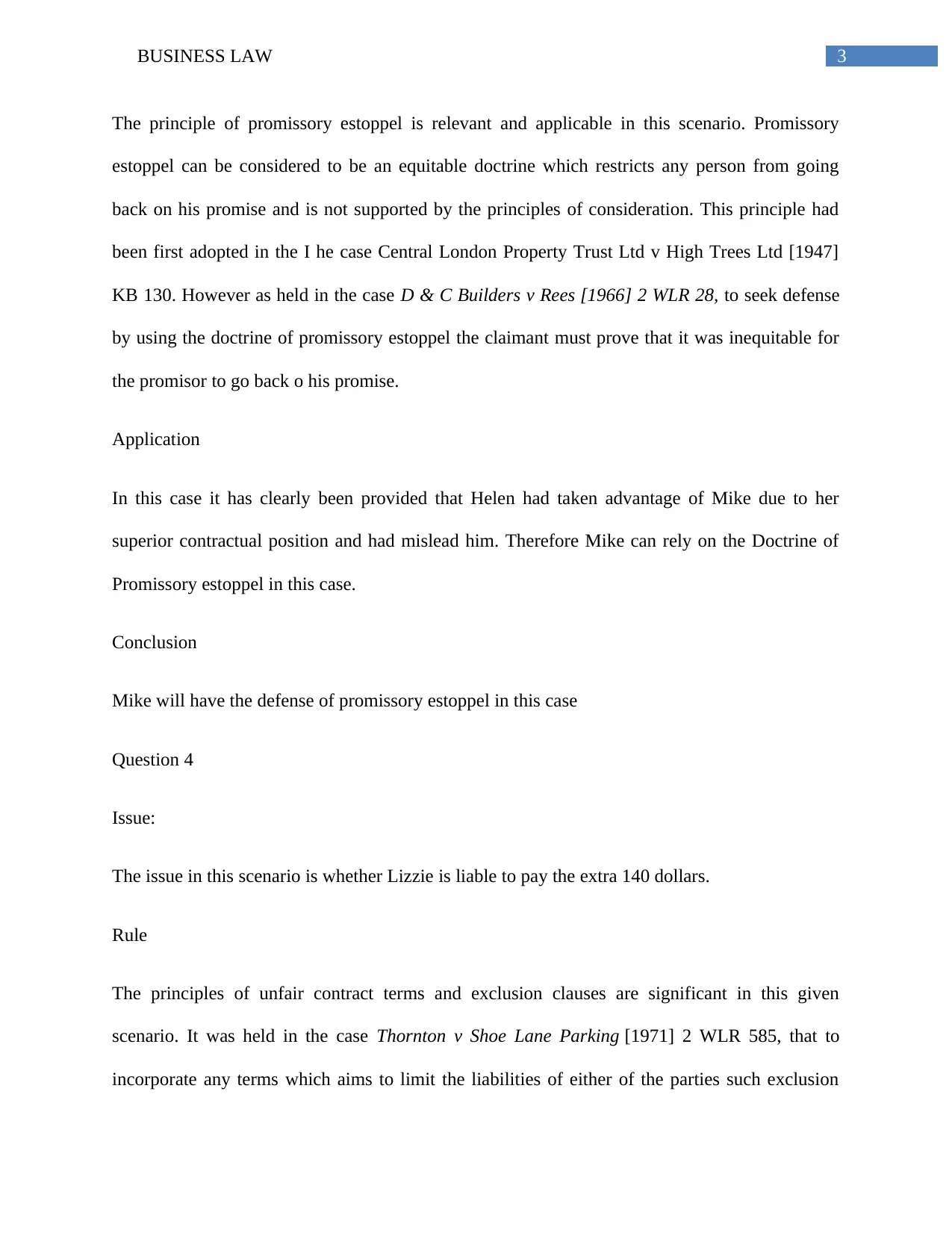
3BUSINESS LAW
The principle of promissory estoppel is relevant and applicable in this scenario. Promissory
estoppel can be considered to be an equitable doctrine which restricts any person from going
back on his promise and is not supported by the principles of consideration. This principle had
been first adopted in the I he case Central London Property Trust Ltd v High Trees Ltd [1947]
KB 130. However as held in the case D & C Builders v Rees [1966] 2 WLR 28, to seek defense
by using the doctrine of promissory estoppel the claimant must prove that it was inequitable for
the promisor to go back o his promise.
Application
In this case it has clearly been provided that Helen had taken advantage of Mike due to her
superior contractual position and had mislead him. Therefore Mike can rely on the Doctrine of
Promissory estoppel in this case.
Conclusion
Mike will have the defense of promissory estoppel in this case
Question 4
Issue:
The issue in this scenario is whether Lizzie is liable to pay the extra 140 dollars.
Rule
The principles of unfair contract terms and exclusion clauses are significant in this given
scenario. It was held in the case Thornton v Shoe Lane Parking [1971] 2 WLR 585, that to
incorporate any terms which aims to limit the liabilities of either of the parties such exclusion
The principle of promissory estoppel is relevant and applicable in this scenario. Promissory
estoppel can be considered to be an equitable doctrine which restricts any person from going
back on his promise and is not supported by the principles of consideration. This principle had
been first adopted in the I he case Central London Property Trust Ltd v High Trees Ltd [1947]
KB 130. However as held in the case D & C Builders v Rees [1966] 2 WLR 28, to seek defense
by using the doctrine of promissory estoppel the claimant must prove that it was inequitable for
the promisor to go back o his promise.
Application
In this case it has clearly been provided that Helen had taken advantage of Mike due to her
superior contractual position and had mislead him. Therefore Mike can rely on the Doctrine of
Promissory estoppel in this case.
Conclusion
Mike will have the defense of promissory estoppel in this case
Question 4
Issue:
The issue in this scenario is whether Lizzie is liable to pay the extra 140 dollars.
Rule
The principles of unfair contract terms and exclusion clauses are significant in this given
scenario. It was held in the case Thornton v Shoe Lane Parking [1971] 2 WLR 585, that to
incorporate any terms which aims to limit the liabilities of either of the parties such exclusion
Paraphrase This Document
Need a fresh take? Get an instant paraphrase of this document with our AI Paraphraser
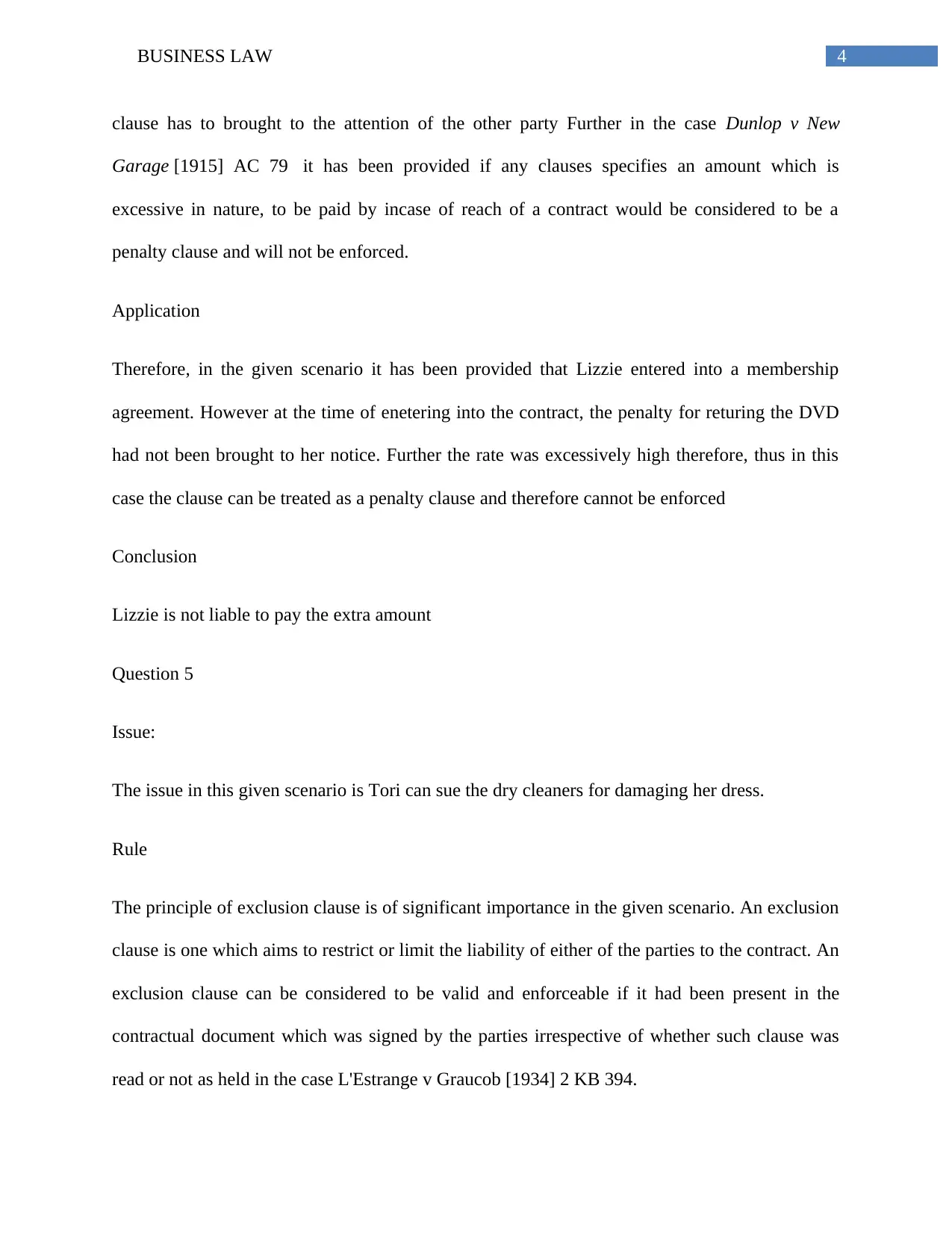
4BUSINESS LAW
clause has to brought to the attention of the other party Further in the case Dunlop v New
Garage [1915] AC 79 it has been provided if any clauses specifies an amount which is
excessive in nature, to be paid by incase of reach of a contract would be considered to be a
penalty clause and will not be enforced.
Application
Therefore, in the given scenario it has been provided that Lizzie entered into a membership
agreement. However at the time of enetering into the contract, the penalty for returing the DVD
had not been brought to her notice. Further the rate was excessively high therefore, thus in this
case the clause can be treated as a penalty clause and therefore cannot be enforced
Conclusion
Lizzie is not liable to pay the extra amount
Question 5
Issue:
The issue in this given scenario is Tori can sue the dry cleaners for damaging her dress.
Rule
The principle of exclusion clause is of significant importance in the given scenario. An exclusion
clause is one which aims to restrict or limit the liability of either of the parties to the contract. An
exclusion clause can be considered to be valid and enforceable if it had been present in the
contractual document which was signed by the parties irrespective of whether such clause was
read or not as held in the case L'Estrange v Graucob [1934] 2 KB 394.
clause has to brought to the attention of the other party Further in the case Dunlop v New
Garage [1915] AC 79 it has been provided if any clauses specifies an amount which is
excessive in nature, to be paid by incase of reach of a contract would be considered to be a
penalty clause and will not be enforced.
Application
Therefore, in the given scenario it has been provided that Lizzie entered into a membership
agreement. However at the time of enetering into the contract, the penalty for returing the DVD
had not been brought to her notice. Further the rate was excessively high therefore, thus in this
case the clause can be treated as a penalty clause and therefore cannot be enforced
Conclusion
Lizzie is not liable to pay the extra amount
Question 5
Issue:
The issue in this given scenario is Tori can sue the dry cleaners for damaging her dress.
Rule
The principle of exclusion clause is of significant importance in the given scenario. An exclusion
clause is one which aims to restrict or limit the liability of either of the parties to the contract. An
exclusion clause can be considered to be valid and enforceable if it had been present in the
contractual document which was signed by the parties irrespective of whether such clause was
read or not as held in the case L'Estrange v Graucob [1934] 2 KB 394.
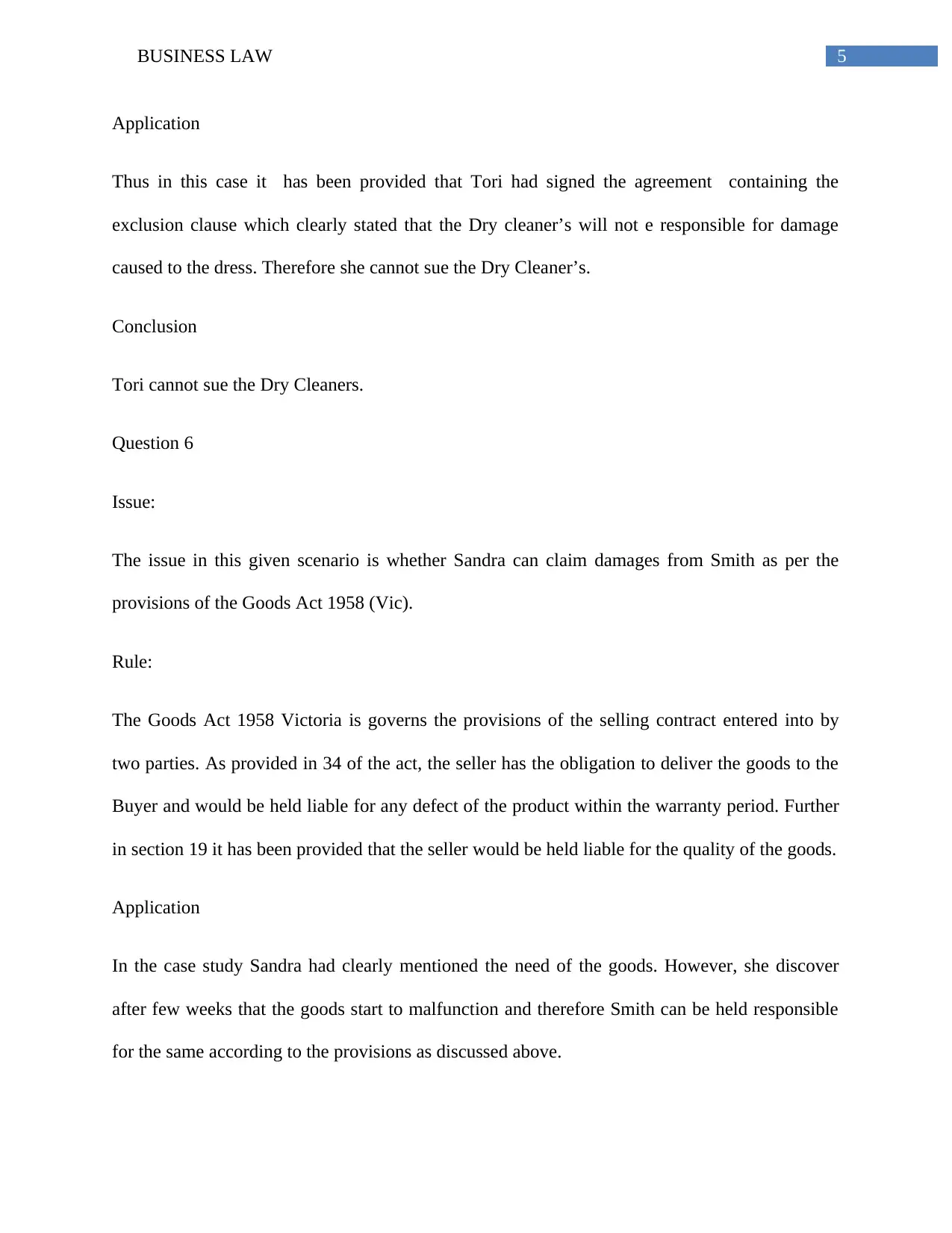
5BUSINESS LAW
Application
Thus in this case it has been provided that Tori had signed the agreement containing the
exclusion clause which clearly stated that the Dry cleaner’s will not e responsible for damage
caused to the dress. Therefore she cannot sue the Dry Cleaner’s.
Conclusion
Tori cannot sue the Dry Cleaners.
Question 6
Issue:
The issue in this given scenario is whether Sandra can claim damages from Smith as per the
provisions of the Goods Act 1958 (Vic).
Rule:
The Goods Act 1958 Victoria is governs the provisions of the selling contract entered into by
two parties. As provided in 34 of the act, the seller has the obligation to deliver the goods to the
Buyer and would be held liable for any defect of the product within the warranty period. Further
in section 19 it has been provided that the seller would be held liable for the quality of the goods.
Application
In the case study Sandra had clearly mentioned the need of the goods. However, she discover
after few weeks that the goods start to malfunction and therefore Smith can be held responsible
for the same according to the provisions as discussed above.
Application
Thus in this case it has been provided that Tori had signed the agreement containing the
exclusion clause which clearly stated that the Dry cleaner’s will not e responsible for damage
caused to the dress. Therefore she cannot sue the Dry Cleaner’s.
Conclusion
Tori cannot sue the Dry Cleaners.
Question 6
Issue:
The issue in this given scenario is whether Sandra can claim damages from Smith as per the
provisions of the Goods Act 1958 (Vic).
Rule:
The Goods Act 1958 Victoria is governs the provisions of the selling contract entered into by
two parties. As provided in 34 of the act, the seller has the obligation to deliver the goods to the
Buyer and would be held liable for any defect of the product within the warranty period. Further
in section 19 it has been provided that the seller would be held liable for the quality of the goods.
Application
In the case study Sandra had clearly mentioned the need of the goods. However, she discover
after few weeks that the goods start to malfunction and therefore Smith can be held responsible
for the same according to the provisions as discussed above.
⊘ This is a preview!⊘
Do you want full access?
Subscribe today to unlock all pages.

Trusted by 1+ million students worldwide

6BUSINESS LAW
Conclusion
Sandra can claim damages fro Smith.
Conclusion
Sandra can claim damages fro Smith.
Paraphrase This Document
Need a fresh take? Get an instant paraphrase of this document with our AI Paraphraser
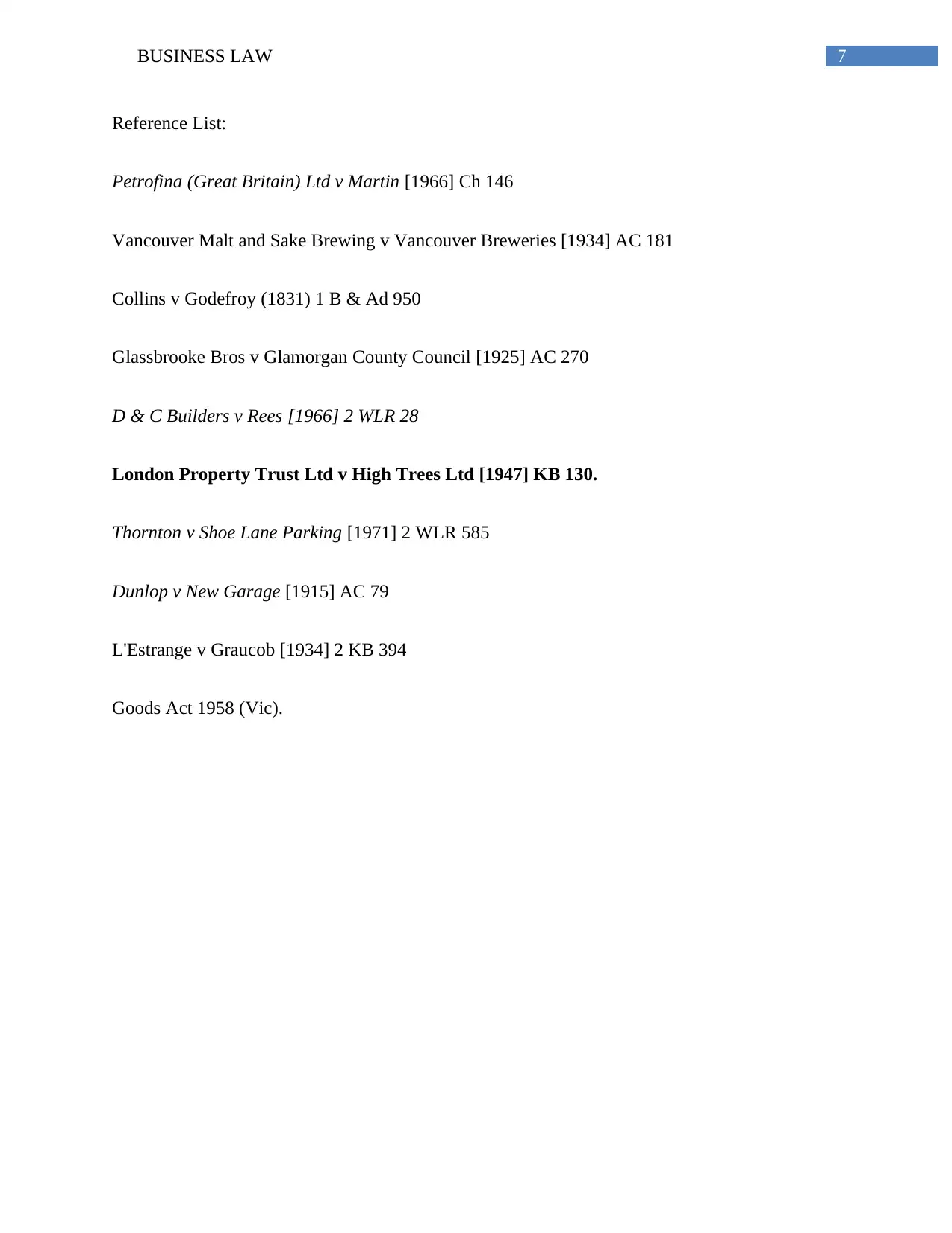
7BUSINESS LAW
Reference List:
Petrofina (Great Britain) Ltd v Martin [1966] Ch 146
Vancouver Malt and Sake Brewing v Vancouver Breweries [1934] AC 181
Collins v Godefroy (1831) 1 B & Ad 950
Glassbrooke Bros v Glamorgan County Council [1925] AC 270
D & C Builders v Rees [1966] 2 WLR 28
London Property Trust Ltd v High Trees Ltd [1947] KB 130.
Thornton v Shoe Lane Parking [1971] 2 WLR 585
Dunlop v New Garage [1915] AC 79
L'Estrange v Graucob [1934] 2 KB 394
Goods Act 1958 (Vic).
Reference List:
Petrofina (Great Britain) Ltd v Martin [1966] Ch 146
Vancouver Malt and Sake Brewing v Vancouver Breweries [1934] AC 181
Collins v Godefroy (1831) 1 B & Ad 950
Glassbrooke Bros v Glamorgan County Council [1925] AC 270
D & C Builders v Rees [1966] 2 WLR 28
London Property Trust Ltd v High Trees Ltd [1947] KB 130.
Thornton v Shoe Lane Parking [1971] 2 WLR 585
Dunlop v New Garage [1915] AC 79
L'Estrange v Graucob [1934] 2 KB 394
Goods Act 1958 (Vic).
1 out of 8
Related Documents
Your All-in-One AI-Powered Toolkit for Academic Success.
+13062052269
info@desklib.com
Available 24*7 on WhatsApp / Email
![[object Object]](/_next/static/media/star-bottom.7253800d.svg)
Unlock your academic potential
Copyright © 2020–2026 A2Z Services. All Rights Reserved. Developed and managed by ZUCOL.



